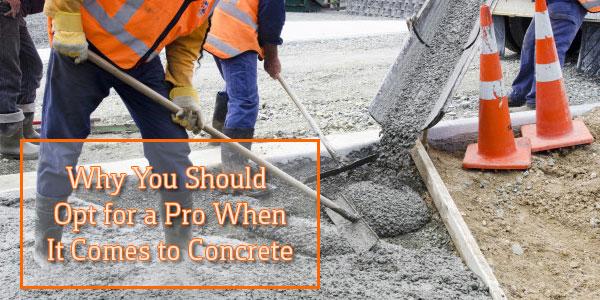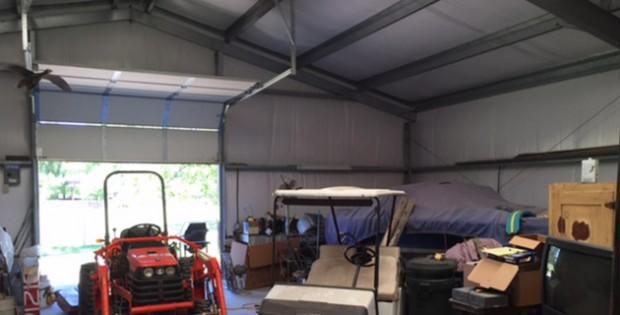Why You Should Opt for a Pro When It Comes to Concrete

It is the most widely used man-made material on the planet and it’s perhaps the most misunderstood. It’s concrete and it’s a necessary component to your first time building project. Whether you opt for a traditional build or the convenience and affordability of a pre-engineered structure for your first time building project, you will need at least some concrete.
First, let me just clear up one big misconception, there is a difference between cement and concrete. In a nutshell, cement is any type of binder that holds materials together. It is construction glue if you will. Concrete is cement mixed with aggregates such as sand, gravel, small rocks and water. It is then left to harden – or cure. But this is trivial knowledge which may only assist you in a game of bar trivia because when you place an order for ‘cement,’ for your project it is likely your vendor will still know that you’re ordering concrete.
The second thing you must know is that a concrete wall or floor is so much more than just a thick slab placed on the ground. Sure, it looks like a gigantic and simple chunk of hardened smooth rock, but it is actually a carefully engineered piece of performance material, and it will require the specialized skills of a professional to design, mix, pour, and set.
Concrete is purchased by the cubic yard. Once you have worked with your project manager and structural engineer and have settled on the above ground portion of your building project it is then time to plan what this structure will set upon. At this point you will need to deal with a civil engineer or an engineer that specializes in foundations and concrete. This engineer will help you determine how much of the material you will need.
Just as choosing a local builder for his convenient proximity for your first time building project, it is also recommended that you choose a local civil engineer. A local engineer comes with an intimate knowledge of soil types, climate issues, and geo-technical data such as minimum seismic activity requirements. You can, of course, choose an engineer from outside your area because they appear less expensive, but keep in mind that this may cost you more money in the long run because it is probable that they will design your concrete load requirements with the highest level of standards required by your county or state.
This means that you should choose to pay a few hundred extra dollars for a local civil engineer who can design a more efficient concrete system specific to your exact location, saving you thousands in materials that can be considered overkill.
Concrete systems require concrete, obviously, but they also require things like rebar, clips, hairpins, anchor bolts and a whole assortment of other materials which cost money. There is no reason to pay thousands of dollars for a concrete slab which will withstand heaving clay laden soil if your building site is on stable ground, for instance.
In terms of planning your schedule, you must also keep in mind that concrete needs time to cure. The longer it cures, the stronger it becomes. Do not plan on laying concrete on a Friday and begin constructing the top structure on Monday morning. There are ways to decrease the curing time – choosing a heavier grade concrete which will give you the minimum grade requirement in a shorter amount of time, for instance – but as a general rule, you should plan on at least two weeks minimum for sufficient cure time – longer if possible.
Planning also requires that you are mindful of climate and temperature. It is best to pour concrete between 45 degrees and 85 degrees Fahrenheit. The colder it is, the longer it will take the concrete to dry. Rainy summers will also create a problem as you do not want your concrete to be engulfed with water. Water is a key ingredient to an effective concrete mixture so adding additional water will disrupt your water/dry material ratio. This could lead to cracking in the future or diminished performance of the concrete.
It is important to note that because of increased global industrialization, concrete has become very expensive in recent years. In fact, it has been the victim of one of the highest price increases of construction materials. For this reason, it is important that you plan, plan, and plan again leaving little room for a mistake or a ‘do-over.’
While most of us see concrete as a simple stone-like piece of material it is actually a critical and dynamic working system which must be engineered and poured by professionals who understand its properties. For your first building project, this one of the few times I will advise that you do not attempt to complete this phase on your own – and that’s the concrete truth.
Share this blog with other first time builders considering pouring concrete on their own. You might save them from a costly headache. Please share with us your concrete horror stories and what you have learned.
Need Space? Considering a steel building? Check out other First Time Builder resources.
« More Work & Lessons Learned Means Contractors Are Declining New Business
5 Marketing Tricks To Make Your Congregation Explode! »
Popular Posts

I’ve seen steel buildings increase in popularity every day because builders use these durable, versatile and flexible construction solutions in every application. Not only have homeowners utilized a steel building for residential purposes, but builders have also made additions to their existing property. No doubt that a steel building garage will increase the value of a home, …
Will Adding a Steel Building Increase My Property Value? Read More »

What is the first step of a steel building project, or any construction project for that matter? After you decide to add a new garage, agricultural or commercial building to your property, you’ll most likely start contacting steel building manufacturers for steel building quotes. From there, you can create a timeline for yourself and develop …
Steel Building Quotes: Get a Grasp on Prices and Estimates Read More »

